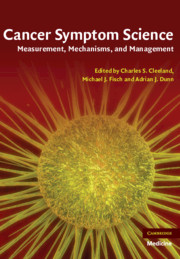Book contents
- Frontmatter
- Contents
- Contributors
- Foreword
- Credits and acknowledgements
- Section 1 Introduction
- Section 2 Cancer Symptom Mechanisms and Models: Clinical and Basic Science
- Section 3 Clinical Perspectives In Symptom Management and Research
- 20 Promoting symptom research in cooperative groups
- 21 Practical aspects of symptom management in patients with cancer
- 22 The economics of cancer-related symptoms: valuing supportive-care interventions
- Section 4 Symptom Measurement
- Section 5 Government and Industry Perspectives
- Section 6 Conclusion
- Index
- Plate section
- References
21 - Practical aspects of symptom management in patients with cancer
from Section 3 - Clinical Perspectives In Symptom Management and Research
Published online by Cambridge University Press: 05 August 2011
- Frontmatter
- Contents
- Contributors
- Foreword
- Credits and acknowledgements
- Section 1 Introduction
- Section 2 Cancer Symptom Mechanisms and Models: Clinical and Basic Science
- Section 3 Clinical Perspectives In Symptom Management and Research
- 20 Promoting symptom research in cooperative groups
- 21 Practical aspects of symptom management in patients with cancer
- 22 The economics of cancer-related symptoms: valuing supportive-care interventions
- Section 4 Symptom Measurement
- Section 5 Government and Industry Perspectives
- Section 6 Conclusion
- Index
- Plate section
- References
Summary
In addition to treating the patient's underlying malignancy, high-quality cancer care requires comprehensive symptom management. As stated by the Institute of Medicine, one of the goals of symptom management for those at the end of life is to prevent or relieve all avoidable suffering. But what is suffering? According to Cassell, suffering occurs not merely in a body but in a person in whom intactness is threatened. To reduce suffering, clinicians must come to understand their patients robustly. All patients have narratives of their illness that include their personal history, families, daily routines, and spirituality (Figure 21.1). In practical terms, thoroughly understanding patients' situations and helping them stay free of avoidable suffering is a lofty goal. To achieve that goal, clinicians must understand the definition of suffering (including what suffering might be considered unavoidable), know how to identify and monitor a patient's suffering over time, and be able to formulate a plan for preventing or eliminating that suffering.
In previous chapters, we outlined the current knowledge regarding many of the most common symptoms cancer patients experience. However, as is often the case in medicine, translating basic and clinical science into the daily practice of symptom management remains a challenge. The goal of relieving cancer patients of avoidable suffering is made more difficult because so few well-conducted, generalizable clinical trials investigating specific interventions for the management of symptoms and their functional disturbances have been performed.
- Type
- Chapter
- Information
- Cancer Symptom ScienceMeasurement, Mechanisms, and Management, pp. 247 - 258Publisher: Cambridge University PressPrint publication year: 2010



